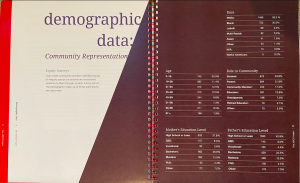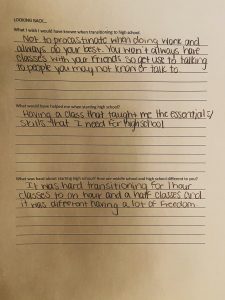Competency 7: Assess with Individuals, Families, Groups, Organizations, and Communities
Assess with individuals, families, groups, organizations, and communities

I have learned the ethical steps in assessments, along with the important role that assessments play in the broader picture of social work practice. Over the course of the past year, I have used critical thinking and the knowledge and skills I have gained during my masters experience to carry out assessments with individuals from a variety of different backgrounds. I have integrate my learning about how to appropriately execute assessments in a way that is ethical and evidence-based. I have applied my knowledge of person-in-environment and other frameworks such as systems theory as I collaborated with clients towards setting goals and intervention strategies. I have especially used these skills with high-school age students who are in the Identity vs. Role Confusion stages of development, and whom are reaching for milestones such as gaining academic skills and competencies. I have remembered the social work value of service and dignity and worth of the person as I have respectfully aimed to connect with clients in a way which makes them comfortable.
PRACTICE BEHAVIORS:
7A: Formulate comprehensive assessments, using a variety of diagnostic classifications systems.
Academic Evidence: As a part of the School Social Work Emphasis course, I met with a mother of a one year old girl to fill out a biopsychosocial report: Biopsychosocial Piper Soland. This mother was having concerns for her child’s developmental milestones, and she wanted to know what things would be helpful for her to do. Together we went through a biopsychosocial assessment, where I gathered information about the child and family’s background, education, mental health and health histories, and current situational factors. I talked with the mother about specific details regarding the child’s behaviors, and the mother’s concerns. We discussed a plan of action for the child, I shared a variety of helpful resources, and I typed out a written report of the assessment (cognitive level: synthesis).
Field Evidence: During my practicum representing the Chickamauga City Schools, I attended a Walker County Stable Families meeting. At this meeting, several professionals who represented schools, businesses, and nonprofits in the area collaborated amongst each other in a discussion about the community’s needs. As a group, we reviewed the current county statistics which addressed the state of strengths and needs for the Walker County area (cognitive level: evaluation). The data and statistics revealed a major need for transportation options, affordable housing, mental health resources, education about health, and guidance for parenting skills. Amongst the discussion about the data results, several individuals expressed the need for an increase of nonprofit and resource collaboration and communication. This assessment of community needs allowed for myself and those present to grasp the current state of the county, and begin planning steps for an intervention. Here is an image of some of the notes I took during this meeting: Stable Families. Meeting Notes.
Other Evidence: In the fall of 2019, I teamed with Unifi-Ed of Hamilton County, an organization which aims to achieve equitability in public education throughout the Hamilton County School system. The organization has started up what is called the APEX Project, or the Action Plan for Educational Excellence. In the past year, I have attended meetings and collaborated with Unifi-Ed members to show support for this project. In October, I met with two administrators to discuss the assessment of the Hamilton County schools and further hear about their project details. In seeking data and assessing the community, there are now highlighted priority areas in which the organization aims to help. In this experience, I was taking part in a mission which will eventually expand social justice in the Hamilton County area. Below is an image of a section of the APEX Project pamphlet which displays demographic data results for Hamilton County schools:

7B: Design and implement organizational and/or community assessments.
Academic Evidence: During the Advanced Administrative Practices course, I formed a program proposal which aims to address the issues of compassion fatigue, burnout, and lack of self-care for social workers and related professionals who do work in hospice(cognitive level: synthesis). In the early stages of this process, I carried out a needs assessment in research to understand what types of self-care interventions might be the most helpful in order to prevent anxiety, compassion fatigue, and burnout amongst employees. Furthermore, the program plan includes a pre-program survey which aims to statically understand the current state of employees as they deal with issues of anxiety, burnout, stress, and compassion fatigue. In this process, I ultimately aim to emphasize the value of protecting the dignity and worth of all individuals. In the case of this program, those individuals are social workers and mental health professionals who work hard to help others and fall risk to harming themselves in the process. Attached is a link to the final program proposal: Admin- Final Paper.
Field Evidence: In my practicum setting, I teamed with the school counselor and Gordon Lee High School to assess the needs of high school freshmen who enter a new environment where they deal with a variety of positive and negative emotions and experiences. I incorporated literary research along with student and faculty feedback in order to assess the school system’s existing procedures and practices of providing transitional support to students who are starting high school. In this process, it became clear that high school freshmen might need additional support from either students or teachers in order to make their academic and social transition less daunting. This assessment next lead me to form my special project of integrating a peer mentorship program at Gordon Lee High School (affective level: responding). In designing the assessment, I incorporated the values of service, dignity and worth of the students, and social justice within the educational system. Below is an image of a student giving anonymous feedback to aid in our assessment of freshman needs.
